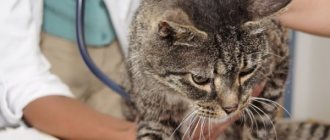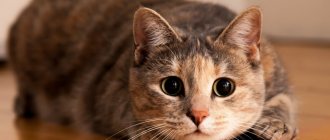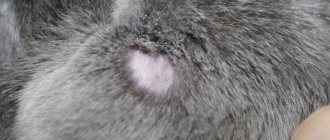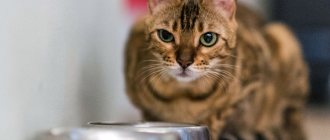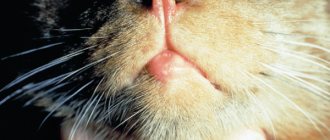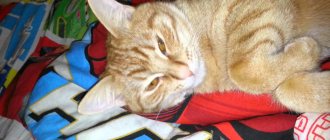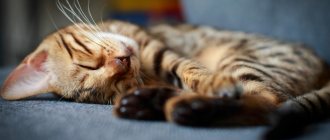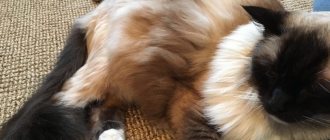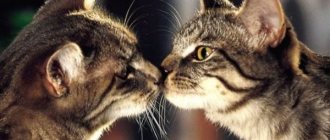Violent condemnation of strict selection rules for the modeling business at one time created the “delirium of Anorexia” - a serious disease that turns young girls into “walking skeletons”. However, refusal to eat is far from being a purely professional disease of models; the disease can affect anyone, including your pet. Anorexia in cats is a companion to most diseases of an infectious nature, vitamin deficiency and disorders of the gastrointestinal tract.
Why does pathology occur?
False anorexia
The condition is characterized by a temporary refusal to eat in the presence of a feeling of hunger. Causes:
- Unsuitable food. The cat approaches the bowl, sniffs the food and again begs for something from the owner. This behavior occurs in picky and spoiled individuals or when switching from one brand of food to another.
- Nasal polyps or rhinitis. Nasal congestion negatively affects the olfactory receptors, so the animal does not smell the food and refuses to eat it.
- Accumulation of hair or foreign object entering the gastrointestinal tract. The pet cannot eat because the stomach or intestines are already full or eating is painful.
- Diseases of the oral cavity. Stomatitis, gingivitis, and abscess provoke the appearance of ulcers and bleeding. Ingestion of food causes severe pain. The cat wants to eat, but it hurts, so she refuses.
- Stress. Noisy parties at the owner's house, changes in surroundings, and renovations increase the cat's nervous excitability, which leads to suppressed feelings of hunger.
- Vaccination. It is allowed to refuse food for 1-2 days after vaccination, since the body actively produces antibodies during this period.
- Dirty dishes. An unwashed bowl with the remains of dried food discourages cats from wanting to eat, since such food smells bad to the animal’s sensitive sense of smell.
True anorexia
Exhaustion of a pet may be associated with the development of a disease in the body, due to which it refuses to eat.
Appetite disorder is often associated with severe systemic illnesses, when the cat is not hungry and refuses to eat because it feels bad. Causes:
- Diseases of the gastrointestinal tract. These are colitis, stomach ulcers, gastritis, helminthic infestations.
- Dangerous infections. Lack of appetite is justified in cases of panleukopenia, pneumonia, calcivirosis, and rabies.
- Poisoning with medications, chemicals, gases.
- Severe injuries to internal organs.
- Surgical intervention.
- Chemotherapy or treatment with toxic, potent drugs.
- Malignant neoplasms.
- Endocrine disorders.
- Kidney inflammation.
- Age-related changes. Old cats lose their sense of smell, so they cannot detect smell and eat irregularly.
What are the causes of anorexia and pseudoanorexia?
Pet stores today sell quite a lot of cat vitamins, which include seaweed and catnip, yeast and other beneficial substances. They are designed specifically for pets. These are appetite stimulants for cats that improve metabolism.
Many cats love to eat sprouted grass. It also improves the animal's appetite and strengthens the immune system. You can buy sprouted grass at a pet store or grow it yourself. It's no secret that the key to a good appetite is a healthy stomach. Therefore, you need to monitor your pet’s nutrition from a very early age and try to keep it in the best possible condition.
If poor appetite is associated with stress, then catnip will be a good help. What is it for? It has a positive effect on the body, calms and helps relieve stress. Moreover, the grass is completely harmless to digestion. Many medications to increase appetite in cats contain extracts of this plant, due to which they give excellent results. The plant has only one drawback: it cannot be used often, because otherwise it becomes addictive.
Decreased or absent appetite in your pet can be caused by a variety of reasons.
Loss of appetite is usually one of the symptoms of anorexia. Anorexia is a disease in which an animal is unable to eat or refuses to eat.
It is worth paying close attention to a decrease or loss of appetite in a cat, as this may be one of the first signs of illness, such as: diseases of the digestive system (diseases of the esophagus, stomach, intestines, liver, pancreas), kidneys, blood, eyes, mouth, nose and throat, skin, brain and other organs.
Regardless of the cause, loss of appetite can be detrimental to your pet's health if it lasts 24 hours or more. Kittens (under 6 months) are especially prone to problems caused by loss of appetite.
When your cat does not eat and you, not knowing what to do, are looking for advice on this topic on the Internet on forums, we recommend not to self-medicate or experiment on your beloved cat. The fact is that there are many reasons for an animal’s lack of appetite, and the consequences of your experiment may disappoint you and your family.
There are many potential causes of decreased food intake, and an important first step in identifying them is to understand whether the cat is suffering from real or pseudoanorexia. Does she want to eat but can't, or is she truly not interested in eating? Your veterinarian should take a detailed history of the cat to understand what the root cause of the disease may be.
Next, he will conduct a thorough physical examination to look for obvious physical explanations for decreased food intake. Then, if required, the necessary diagnostic tests will be performed. Tests may include laboratory tests such as blood tests, mineral balance tests, chest and abdominal x-rays, ultrasound, and possibly endoscopy.
Potential causes of pseudoanorexia, where a cat is unable to eat or has severe difficulty eating, include:
- Stomatitis, gingivitis, esophagitis and pain in the tissues of the mouth and throat.
- Periodontal disease, which can spread to healthy teeth.
- Abscesses in the orbit.
- Pain in the masticatory muscles.
- Pain in the temporomandibular joint.
- Cytomegaly.
- Diseases of the nervous system affecting chewing and swallowing.
- Cancer or tumors of the mouth, tongue, or tonsils.
- Pain in other parts of the body. Chronic pain can suppress a cat's appetite and ability to get to food or water, such as back pain.
READ Why does a cat bite her kittens?
True anorexia can also have many different causes:
- Severe illnesses such as infections or dysfunction of certain organs.
- Poisoning.
- Psychological problems such as stress, changes in daily routine and environment, unpleasant or unwanted foods.
- Diseases of the immune system.
- The cat is not able to smell the aroma. Smell is an important factor in food consumption.
- Cancer of all types.
- Intestinal obstruction.
- Stomach or intestinal ulcer.
- High ambient temperature.
- Side effects of medications.
Healthy cats have a good appetite. Of course, in order for a cat to run, jump, frolic and play, it needs energy, which it gets from the food it eats. However, when a cat is sick, its appetite may not be as good. If the cat refuses to eat at all, the owners must establish the reason for this behavior.
However, we would like to immediately draw your attention to the fact that statements of such a nature as a cat refusing to eat relate to those foods from its diet that it is accustomed to and loves. If your cat has been eating fish all her life, and you suddenly decide to switch her to another type of food, for example, dry food, it is not surprising that she will refuse such food.
What do you usually feed your cat? Perhaps the loss of appetite is due to the fact that you changed the manufacturer of canned food or purchased food of a lower class? In fact, the cat cares what it eats, and therefore its taste preferences are quite stable. Dramatic changes in this area are always accompanied by internal rejection, which is difficult to overcome.
Change of mood
Cats are very sensitive creatures, and some of them are very weather dependent. Therefore, a sudden change in weather (when it is too hot outside, many cats have a poor appetite), some kind of stress (you forgot to pet the cat before breakfast), all this can lead to the fact that your kitty will not be in the mood for dinner.
If you taught your cat to eat from her favorite bowl, and then suddenly for some reason you took her food and poured it on the floor, or the cat always ate slightly warmed fish, and then you offer her a product from the refrigerator, your pet may refuse such food , despite his hunger. If the food is too hot, the cat risks getting burned, and once it gets burned, it may completely refuse to eat what you gave it. If the food is too cold (from the freezer), it has absolutely no smell to the cat, and therefore is of no interest to it.
In such a situation, it is better to check the food to see if it is too cold or hot; if everything is ok, you can bring the cat to the bowl and stroke its back, thus inviting it to eat.
Cats are capricious and mysterious creatures. They only do what they like. They come when they want, not when asked. At the same time, it is quite rare to find specimens that will eat from a bowl everything that you consider necessary to put there. Most often they are very picky and capricious. Therefore, owners often ask the question of how to increase a cat’s appetite. First you need to understand the reasons for this phenomenon.
A cat, whether sick or not, may lose its appetite.
And the reasons may be: nervousness, stress or illness.
- Nervousness may be due to a change in your cat's diet, dirty food trays, having to eat from the same tray with other cats, an unsuitable place to eat, etc.
- Stress is a very common reason why cats lose their appetite. Changing his place of residence, bullying him by another domestic cat (or dog).
- Diseases. There are many reasons why a sick cat loses its appetite.
But more often, anorexia occurs in sick cats, and the following possible medical reasons contribute to this.
- An abscess is a pocket of pus under the skin that occurs when bacteria living on the skin or teeth enter the body through a puncture (bite), most often during a cat fight.
- Addison's disease (hypoadrenocorticism)
An endocrine disease in which chronic insufficiency of the adrenal cortex leads to a deficiency of hormones, especially cortisol.
- Anemia is a decrease in the number of red blood cells due to a number of factors, such as illness or blood loss.
- Bacterial infections.
- Some medications.
- Coccidiosis is a protozoal infection most often observed in kittens under six months of age.
- Dental or oral pain (gingivitis, tooth abscess, stomatitis).
- Feline diabetes is a condition in which the pancreas does not produce enough insulin or because the cells do not respond to insulin.
- Ulcers of the gastrointestinal tract.
- Glomerulonephritis is a disease caused by inflammation of the nephrons, which are the tiny filtering units in the kidneys.
- Hemobartonellosis is a disease caused by an unusual type of bacteria that attaches to the wall of red blood cells, destroying them in the process of their vital activity.
- Heartworm
- Histoplasmosis is a fungal infection that most often affects the lungs and gastrointestinal system.
- Hypercalcemia is a high level of calcium in the blood.
- Trauma or injuries.
- Intestinal obstruction.
- Poisoning by poison.
- Kidney failure (acute or chronic) is a disease in which the functioning of an organ is disrupted, leading to the accumulation of toxins in the body.
- Nausea. A cat that feels nauseous does not want to eat.
- Cancer (abnormal cell growth).
- Pancreatitis is inflammation of the pancreas.
- Portosystemic shunt is a liver abnormality caused by the development of blood vessels that drain into the intestinal tract.
- Pyometra is a bacterial infection of the uterus.
- Stress (some possible causes of stress include: change of residence, loss of a companion, new pet/person in the house, hospitalization, boarding)
- Vaccinations. The cat may feel unwell for a short period of time. Your cat's appetite should return within a day or two.
- Viral infection (Feline Herpesvirus, Feline Panleukopenia Virus, Calicivirus, FeLV, etc.)
Symptoms: how to recognize the disease?
Despite their fast metabolism, cats do fasting days when they hardly eat and drink a lot of water. If the animal is clear-eyed, curious, playful, moves a lot, but eats little for one day, there is no need to worry. In the absence of appetite against the background of illnesses, there are symptoms of other diseases: fever, lethargy, refusal to play, constipation or diarrhea, vomiting, convulsions. Main symptoms of anorexia:
The disease can be recognized by the behavior of the animal and by palpating the bones, since there is no fat layer.
- reluctance to eat;
- progressive weight loss;
- exhaustion and dystrophy;
- absence of a fatty layer under the skin, bones can be felt.
Diagnostic measures
If a cat does not want to eat for more than 3-5 days, this is a reason to contact a veterinarian, even when the animal visually feels well.
To find out why feline anorexia has developed, the veterinarian examines the mucous membranes of the mouth and throat, performs an external examination of the abdomen, asks whether surgery or drug therapy has been performed, and prescribes diagnostic methods, such as:
- rhinoscopy;
- radiography;
- Ultrasound of the heart and internal organs;
- general and biochemical blood test;
- examination of stool for the presence of helminths.
When should you increase appetite in cats?
All cats need adequate nutrition, but it is especially important that small kittens and pregnant and lactating cats eat well. The first need to develop correctly, and the second need to bear, give birth and feed healthy offspring.
If the kitten is healthy and cheerful, but at the same time thin and eats poorly, it is necessary to increase the baby’s appetite. You can change the main dishes to something else. Perhaps he was tired of the same taste of his usual food. Changing your diet is beneficial and stimulates the desire to eat.
On the advice of a veterinarian, you can offer the kitten vitamins to improve appetite or special cat grass that can be grown at home. This is also suitable for an adult cat.
If a pregnant cat loses its appetite, this is always alarming. Why does a cat lose its appetite? The reasons may be:
- Common toxicosis. In this, cats are not much different from people. They may also experience nausea, aversion to food, and taste disturbances.
- Death of the embryo. If one of the kittens dies in the womb, the cat begins to experience general poisoning of the body. If you suspect such a cause, you should consult a doctor.
- Infection. In this case, you also need to contact your veterinarian.
- Injury. Pregnant cats, like women, are a little clumsy. The expectant mother may get injured during a jump without calculating the distance.
- Constipation. Constipation may occur due to pressure on the intestines.
- Polyhydramnios or multiple births. A large volume of the abdomen compresses the stomach, and the cat begins to eat less.
Of all the reasons to give a cat something special for its appetite, only toxicosis is suitable. The more varied the menu, the better. During pregnancy, cats enjoy eating vegetables and fruits. In all other cases, it is better to contact a veterinarian. When the volume of the stomach decreases, it makes sense to increase the calorie content of food. Your doctor will tell you what is best to feed your pregnant cat.
A nursing cat should eat well.
The birth of kittens is always a long-awaited and joyful event. The owner's task is to help the cat feed its offspring. This requires proper and balanced nutrition. But what to do if a nursing cat suffers from a lack of appetite and does not eat well?
Producing enough milk depends on the quality and quantity of food. In this case, it is simply necessary to increase your appetite.
How to do it? Variety will help improve a nursing cat's appetite. The bowl should always contain fresh food - meat and dairy products. The cat will choose those that are needed at the moment. The frequency of feedings will depend on her desires and needs. Water must be clean, fresh, not boiled and in sufficient quantities. Lactation largely depends on this. The advice of a veterinarian will help to replenish the diet with vitamins, minerals and microelements or increase appetite with medications. A good salesperson will recommend the best cat food formulations.
For a healthy nursing cat, these measures are quite enough.
How is the treatment carried out?
Along with the main treatment, it is recommended to give your pet medications to improve appetite, for example, Mirtazapine.
All medications should be given to your pet as prescribed by a veterinarian; self-medication is prohibited. If the disease is caused by bacteria or viruses, antibiotics or antiviral drugs are recommended, which the doctor prescribes individually. Surgery is also performed if anorexia is caused by a foreign body in the stomach. Mouth ulcers and inflammation should be treated if present. Nervous animals can be given animal sedatives - “Cat Bayun”, “Stop Stress”, “Anti-Stress”. To improve appetite, veterinarians recommend the following medications:
- "Mirtazapine";
- "Peritol";
- "Maropitant";
- "Cyproheptadine";
- "Pernexin";
- "Apilak".
How to feed?
Treatment of anorexia in a cat includes following the diet, even with a complete refusal of food. The feeding area should be clean and the environment calm. In any situation, food “from the table”, smoked, salted, flour is excluded. If your pet doesn't like the food, you can offer him Royal Canin Exigent Aromatic Attraction specialized food for picky cats. Holistic or premium food brands “Shezir”, “Eukanuba”, “Bozita” are also suitable.
If the cat is sick and cannot feed on its own, feeding through a tube or syringe without a needle is recommended. Food should be liquid or pureed. Dry food needs to be soaked in water, since it is difficult for the cat to chew and swallow. Beef or chicken broth is poured in gradually so that the animal has time to swallow and not choke. You can take the cat's pate on your finger and place it on the middle of your pet's tongue, being careful not to press on the root, otherwise vomiting may occur. Wet high-quality food is suitable, which contains a lot of calories and saturates the pet even with little consumption. If a cat has gastritis or an ulcer, the diet is prescribed individually.
What to do if your cat stops eating?
The instructions below apply only to those cases when the animal does not exhibit symptoms of acute diseases, pain, vomiting, breathing problems, pallor, or discharge from the mouth. So, your cat is visually healthy, but for more than a day, she leaves the bowl barely sniffing the food - we act:
- , norm 37.5–39°. Considering that the indicator is individual, measurements are taken every hour. A drop in temperature indicates a loss of strength.
- We constantly monitor the condition of the mucous membranes; normally they are moist, shiny, the nose is cold, the eyes are “alive”, the gums and tongue are pink.
- We track the accommodation of the pupils. Turn off the light and after 3-5 seconds, shine a flashlight into the cat’s eye; the pupils should narrow at the same speed and turn into narrow slits. Violation of accommodation indicates a malfunction of the nervous system, loss of strength or toxicity.
- All procedures are carried out in a quiet, darkened room. Bedding, bowls, litter tray and personal belongings of the pet are transferred to the “ward”. It is advisable to increase the humidity in the hospital room, especially during the heating season - use a humidifier, wet towels hung on the radiators.
